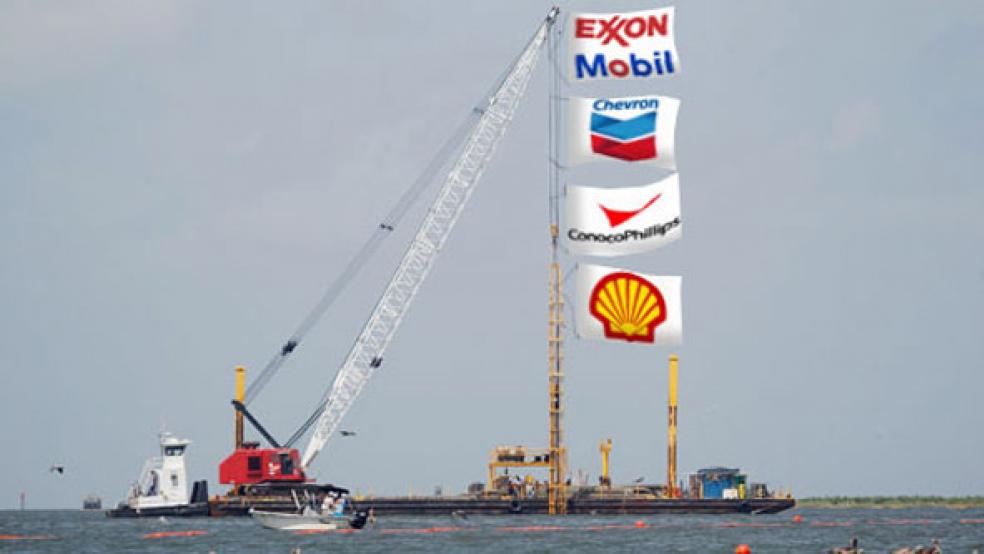Four of the five biggest oil companies have forged a new $1 billion oil spill response and containment plan, it was announced last Wednesday. The plan emphasizes safety and preparedness as companies keep a sharp eye on getting back to deepwater drilling in the Gulf of Mexico.
Like everyone else affected by the disastrous BP oil spill in the Gulf of Mexico, which has taken the lives of 11 workers, injured 17 others, and broken the back of scores of individuals, businesses, and related industries, oil companies and their workers in the Gulf have been hurt, too. “We do think it’s critical for continued development in the Gulf of Mexico to go on,” said John Roper, a spokesman for ConocoPhillips, which, together with Exxon Mobil, Chevron Corporation, and Shell Oil, formed the new response effort. “We’ve successfully drilled 14,000 deepwater wells safely, and the oil and gas retrieved from the Gulf of Mexico accounts for about 30 percent of U.S. production and 770,000 jobs,” said Roper. “So we do want that [moratorium] lifted.”
The Shell Oil Company sounded a similar note. “We acknowledge the reasons for the President’s decision to pause deepwater drilling in the context of this tragedy,” said Kelly op de Weegh, a spokesperson. “But it is not without consequence: thousands of lost jobs, and billions in lost wages and spending, and not only on the Gulf Coast, but in places like Alaska. Shying away from development is not the answer. Offshore drilling is too important to U.S. energy supplies and our economy not to safely and responsibly move forward.”
Director Michael Bromwich of the Department of the Interior said in a statement, “The BP oil spill has made it clear that oil and gas companies did not have the sufficient containment capacity to respond to a major spill. We’re encouraged that a number of companies are taking steps to correct it.”
The four companies developed their voluntary spill response plan over the last several weeks, and each firm has committed $250 million to build a system that can potentially be ready in 6 to 18 months. In the process, the firms are also creating a nonprofit entity called the Marine Well Containment Company, which will oversee operation and maintenance of the emergency system.
BP is not part of this consortium, though industry experts suggest that that it may eventually join. “BP’s got enough on its plate,” said Eric Smith, associate director of the Tulane Energy Institute in New Orleans and an expert on the oil industry. “They can certainly be asked at some point, when they get their act together. Right now I don’t think people want to muddy the waters.”
“More Advancements in the Future”
The four companies said that their new response system will include underwater equipment to forge a permanent seal over a broken well. It will separate oil from gas and carry it to the surface, they said, where the oil can be stored and gas burned off. The system is expected to capture up to 100,000 barrels — or 4.2 million gallons — of oil. “This is really about our industry coming together to find a way to make [deepwater drilling] safe,” said John Roper of ConocoPhillips. “It will be rapidly deployable and tailored specifically to the Gulf of Mexico. And stay tuned: I think you’re going to see more advancements to the system in the future.”
“This has got to be considered good news even by the most doctrinaire anti-oil activist in Washington,” said Eric Smith of Tulane University. “And if the big guys do it, the small guys will go along.”
“I think when you have big companies that are willing to put up a billion dollars of their own, you don’t question the motive,” said Ken Wells, president of the Offshore Marine Service Organization (OMSA) in Hanrahan, La., a consortium of offshore workboat operators who service the rigs. “You say, How fast can they do it? There’s a clear understanding that if we’re going to be ready in the future, we have to have these kinds of resources.”
Congressman Ed Markey, D-Mass., who chairs the Energy and Environment subcommittee, sounded a note of caution about the new plan: “This is only one possible tool in what must be a more robust tool kit for oil companies to respond to spills. This could be a positive step, but it cannot be the industry’s last.”
None of the four companies were involved in the Gulf oil spill, although several of them operate in the Gulf of Mexico. BP has struggled for more than 90 days now to cap and contain the busted well in the soiled Gulf, and this weekend operations are being suspended because of Tropical Storm Bonnie. The storm may put the completion of the two relief wells back two weeks, insiders say.
Additional reporting by Michelle Hirsch.
Tell us your thoughts about this piece, in the box below.



